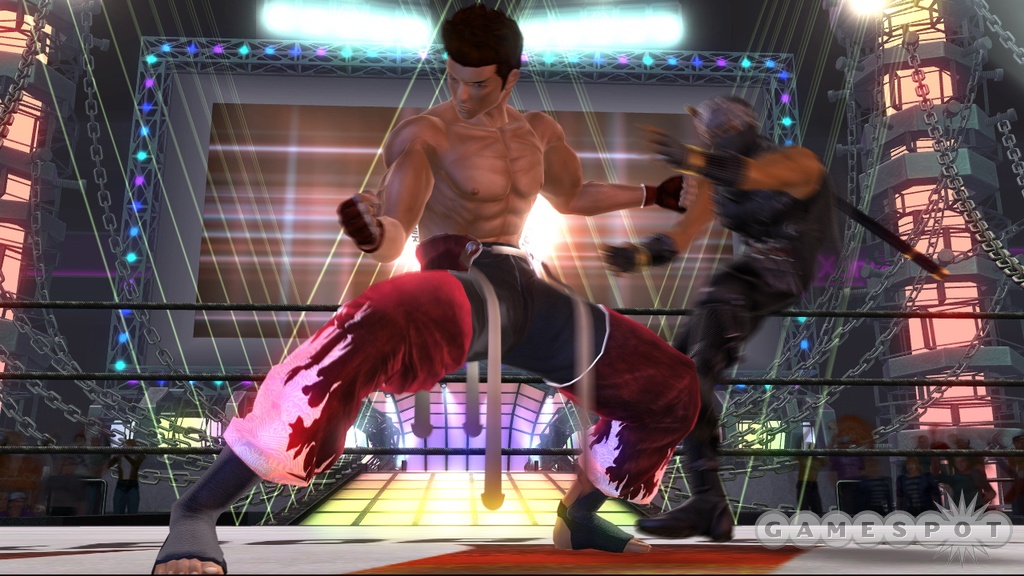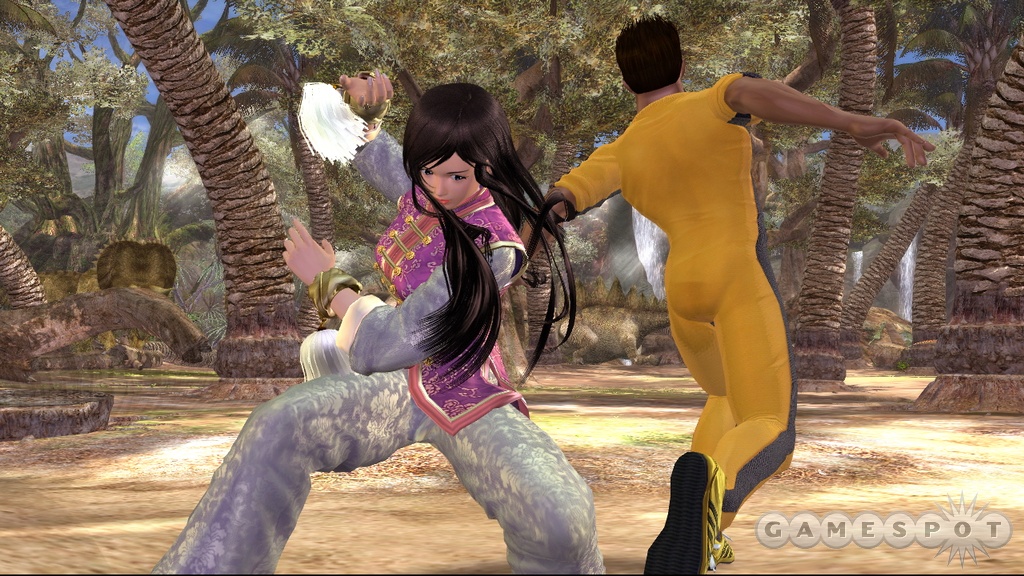Dead or Alive 4 Tomonobu Itagaki Q&A
We check in with Tomonobu Itagaki and Team Ninja as development on the Xbox 360 fighter continues.
Hot on the heels of our look at Dead or Alive 4 at this year's Tokyo Game Show, we had the chance to check in with Team Ninja's head ninja, Tomonobu Itagaki, for an update on the promising Xbox 360 fighter. Besides shedding light on the changes going into the upcoming game, the veteran developer shared some thoughts on Team Ninja's future projects as well. Best of all, he let us get the first high-definition direct feed of the game, which you won't find anywhere else in the world.
GameSpot: So let's dive right in and talk about some of the new stuff we saw. The most striking is the new screen blur and shake when you're staggered. What can you tell us about this?
TI: It's, ah, it's in testing right now. What I'm trying to accomplish here is, you know, by using the movement of the air and so forth, to try to express the feeling inside you after you get punched.
GS: So it's in testing. Do you think you'll keep it?
TI: I'll keep it only if it goes well. Traditionally speaking, we're not into special effects. But with DOA4, we're going to change our tradition a little bit, and we'll be implementing more and more special effects. In the past we've always expressed the feeling of pain from just the [fighting] moves and their movement. But that's a very, you know, stoic type of thing, and we realize that DOA4 is going to be positioned to a broader audience. So we decided to implement more special effects.
GS: Tell us about the changes made to the game's speed and attack systems. Is it just that the combo system changed? Or is it harder to do counters because it's much faster? Or did the timing change, too?
TI: We redesigned all the motion. So, as a result, the timing was changed. The motion data is changed, but the combo system is basically the same. It's been improved upon, but it's basically the same. Making a sequel, or a series, you know, is like adding a new room to your house. And so, you know, you keep some of the things the same. We're even changing, like, basic things, like, Kasumi's high kick.

GS: Why do you feel now is a good time to do that?
TI: Of course, most developers will try to avoid a huge challenge like that in a launch title, but, of course, we had to do it kind of our way, you know? So everyone called me crazy, not just for what you're talking about, but because we're doing something with online that a typical launch game wouldn't even attempt.
GS: How's it been managing all that?
TI: I haven't cleared all those challenges yet, but, you know, I just can't live with doing the same thing [as in past games].
GS: Team Ninja seems to be dealing with 360 development quite well, given the circumstances. Why do you think the team is able to do so well its first time on the platform?
TI: [laughs] I think that's actually a misunderstanding, because I think, you know, we have had a number of problems. For example, Gaidan Black, in order to complete the game, we had to solve about 15,000 bugs. It's nothing more than determination on our part. If we keep on running away from it, we'll never get better. So we just stick with it and get to the end.
I think one of the strengths we have is that we can see things differently from most other people, because we can look at, say, the 360 development kit and say, "It's just a computer." And by doing that, when we face problems, we can solve them easier and better than most, because it's just a computer. So, we have that background, and even when there are very high-level problems with software, such as the API, we still look at it as just another problem. So I'm sure we'll figure it out. And that's what makes us different.
GS: So, let's go back to the fighting system. Last time I was here, you showed me you can kick someone on the ground after they've fallen. Is there a way to counter that or to block it if you're on the ground getting kicked?
TI: Certain characters will have their own special moves. For example, Kasumi and Hayabusa can use ninjitsu, but you know Mariposa can't. But she has another way of dealing with a situation like that.

GS: As far as the online stuff goes, can you tell me a little bit more about [its features], like the shop and the things that you can buy? The last time we talked you mentioned the different TVs. What else can you buy?
TI: Well, you can purchase those TVs, and you can even upgrade them, with three different variations. But only one at a time. We're also looking at creating a banner that has a player's motto on it so you can hang it on the wall.
GS: Your gamertag motto?
TI: Yeah, and then the same message will be on billboards in the city.
GS: Now that development is wrapping up, what do you see as the major element in this installment of the series?
TI: This time, in particular, we're not only focusing on improving the graphics, but we're also improving the game content and playability.
GS: Have you decided on how many alternate costumes?

TI: The number of costumes will be somewhat limited because we're focusing on the playability of the game and spending a whole lot of time and energy doing that. Of course, there's a plan to sell costumes through [the Xbox Live] marketplace.
GS: Let's talk about the [next] game after this. There are a lot of projects that people would like to see from Team Ninja on the 360, so what's in your future? What about DOA Code Cronus?
TI: Well, I can't say too much on Cronus, but it's basically the adventure of Kasumi and Ayane. So it's still in the DOA family. It will have fewer action components than something like Ninja Gaiden. But, of course, there will be some action in it. So it won't be just a fighter or just an action game; it will be something in between. We like action, so you know there's no doubt there's going to be action of some kind.
GS: So of the games on the horizon, such as Cronus or sequels to your Xbox titles, which is next?
TI: Cronus will be the last for sure. Right now I'm trying to decide which one should come first.
GS: Where do you think the industry is going right now as we head into a new generation of consoles? It seems that [in the past] everyone looked to Japan, and now it almost seems like Japan is looking to the US.
TI: I think that's correct. But I think it's better not to look at, you know, games that are made by other people. Events like TGS are seen by some as a chance to go look at everything and see what others are doing. Of course, there are people like me who just, you know, go and look at a few things. I really don't think it's a good idea to look at other people's work. I actually think we [developers] should learn things from different industries. Ultimately, I think that it's a really bad way to go about game development if you try to create something by mimicking someone else's idea.
I see game development as a gamble. I see myself as a gambler. If you play roulette and have to choose between red and black, you just can't get it right all night. Now, just because you can't get it right, you shouldn't be turning to the guy next to you and asking, "What do you think the next one will be?" You should you be sitting there playing roulette and being prepared to win or lose. If you can't, you should get out of there.
GS: What do you think about Microsoft and Nintendo both stating they have to grow the industry by pulling in new players?
TI: I'm just a player and gambler in the big casino, so to speak, so I don't really care what the owner of the casino does to expand the business. All I focus on when I play the game in the casino is whether I can excite the people who are watching me and playing the game with me. And that's all I care about. I'm confident in what I can do with the table called 360. I feel like I can help make it into a very exciting table.
GS: You've mentioned that some of the tweaks being made to DOA4 are being done to give it a broader appeal. Do you want an even broader audience for this one?
TI: Well, let me tell you the misunderstanding of most other makers of fighting games. The most important thing for a fighting game is that it has to be fun, even when you lose. In other words, you know, if you win or lose, it needs to be fun. Of course, to do that you have to be able to have fun soon after you pick up the controller and play. Basically you have to be having fun in five seconds.
From that perspective, DOA is the only one that can make such a claim. So what's important is once the player gets excited, after five seconds or whatever, the real battle begins from there. Of course, I don't believe that--as far as the ability to pick up and play and enjoy it right away--it is difficult. The system [helps with] that. The design of the moves...that has a lot to do with it. So from that perspective--I think--of well-designed moves, Soul Calibur is a well-made game as well.
GS: Thanks for your time, Itagaki-san.
Got a news tip or want to contact us directly? Email news@gamespot.com

Join the conversation